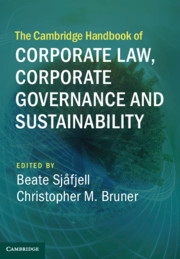Book contents
- Reviews
- The Cambridge Handbook of Corporate Law, Corporate Governance and Sustainability
- The Cambridge Handbook of Corporate Law, Corporate Governance and Sustainability
- Copyright page
- Dedication
- Contents
- Contributors
- Forewords
- Preface
- Introduction
- Part I Global Business and Fragmented Regulation
- Part II Corporate Law, Financial Markets and Sustainability
- Part III Corporate Law, Corporate Governance and Sustainability: Case Studies
- 10 Progress Is Possible
- 11 Green but Not Enough
- 12 The Australian Paradox
- 13 Moving beyond Virtue Signalling
- 14 The EU as a Potential Norm Creator for Sustainable Corporate Groups
- 15 Market-Led Sustainability through Information Disclosure
- 16 Law, Culture and Sustainability
- 17 Stakeholder Value versus Corporate Sustainability
- 18 Worker Participation, Sustainability and the Puzzle of the Volkswagen Emissions Scandal
- 19 Corporate Sustainability and Shareholder Activism in the Netherlands
- 20 Old-Fashioned yet Innovative
- 21 The Unsuccessful Pursuit for Sustainability in Italian Business Law
- 22 Sustainability and the Transformation of the Socialist Corporation into the Private Corporation
- 23 Limited Demand, Limited Supply
- 24 The Pacific Alliance
- 25 Social Environmentalism and Corporate Capture
- 26 The Social and Ethics Committee
- 27 Reforming the Nigerian Oil and Gas Sector
- 28 Enlightenment or Resistance?
- 29 The Community Company as a Vehicle for Sustainability in Solomon Islands
- 30 What Does It Mean to Be Sustainable?
- 31 Shareholder Voting and Corporate Sustainability in China
- 32 Corporate Governance Reform, Social Norms and Sustainability in Japanese Companies
- 33 Achieving Sustainable Development Goals in India
- 34 Sustainability and Legislated Corporate Social Responsibility in Indonesia
- 35 Islamic Financial Institutions and Corporate Sustainability
- 36 Leaders or Laggards?
- Part IV Potential Drivers for Change
- Conclusion
- Index
36 - Leaders or Laggards?
Corporate Sustainability in Hong Kong and Singapore
from Part III - Corporate Law, Corporate Governance and Sustainability: Case Studies
Published online by Cambridge University Press: 25 November 2019
- Reviews
- The Cambridge Handbook of Corporate Law, Corporate Governance and Sustainability
- The Cambridge Handbook of Corporate Law, Corporate Governance and Sustainability
- Copyright page
- Dedication
- Contents
- Contributors
- Forewords
- Preface
- Introduction
- Part I Global Business and Fragmented Regulation
- Part II Corporate Law, Financial Markets and Sustainability
- Part III Corporate Law, Corporate Governance and Sustainability: Case Studies
- 10 Progress Is Possible
- 11 Green but Not Enough
- 12 The Australian Paradox
- 13 Moving beyond Virtue Signalling
- 14 The EU as a Potential Norm Creator for Sustainable Corporate Groups
- 15 Market-Led Sustainability through Information Disclosure
- 16 Law, Culture and Sustainability
- 17 Stakeholder Value versus Corporate Sustainability
- 18 Worker Participation, Sustainability and the Puzzle of the Volkswagen Emissions Scandal
- 19 Corporate Sustainability and Shareholder Activism in the Netherlands
- 20 Old-Fashioned yet Innovative
- 21 The Unsuccessful Pursuit for Sustainability in Italian Business Law
- 22 Sustainability and the Transformation of the Socialist Corporation into the Private Corporation
- 23 Limited Demand, Limited Supply
- 24 The Pacific Alliance
- 25 Social Environmentalism and Corporate Capture
- 26 The Social and Ethics Committee
- 27 Reforming the Nigerian Oil and Gas Sector
- 28 Enlightenment or Resistance?
- 29 The Community Company as a Vehicle for Sustainability in Solomon Islands
- 30 What Does It Mean to Be Sustainable?
- 31 Shareholder Voting and Corporate Sustainability in China
- 32 Corporate Governance Reform, Social Norms and Sustainability in Japanese Companies
- 33 Achieving Sustainable Development Goals in India
- 34 Sustainability and Legislated Corporate Social Responsibility in Indonesia
- 35 Islamic Financial Institutions and Corporate Sustainability
- 36 Leaders or Laggards?
- Part IV Potential Drivers for Change
- Conclusion
- Index
Summary
Over recent decades, a host of smaller jurisdictions have become extraordinarily dominant in specialized fields of cross-border corporate and financial services. Chief among them are Hong Kong and Singapore, both regarded as among the world’s most significant financial centers. This chapter analyzes their track records in achieving corporate sustainability and concludes that each is at once a leader and a laggard, depending on one’s perspective. The analysis highlights complex questions regarding how we ought to conceptualize and evaluate corporate sustainability in an era increasingly defined by the free movement of capital – because Hong Kong and Singapore represent microcosms of our increasingly globalized financial world. The challenges faced in assessing the sustainability of their corporate, financial, and economic models reflect underlying challenges in assessing the sustainability of unfettered global capital mobility.
Keywords
- Type
- Chapter
- Information
- Publisher: Cambridge University PressPrint publication year: 2019

